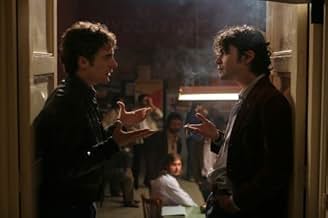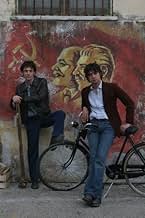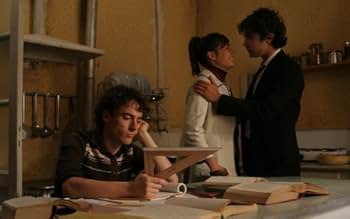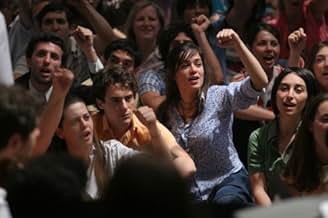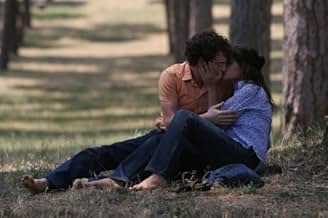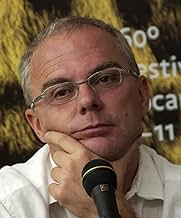IMDb-BEWERTUNG
7,0/10
6871
IHRE BEWERTUNG
Füge eine Handlung in deiner Sprache hinzuTwo brothers come of age in a small Italian town in the '60s and '70s.Two brothers come of age in a small Italian town in the '60s and '70s.Two brothers come of age in a small Italian town in the '60s and '70s.
- Auszeichnungen
- 19 Gewinne & 29 Nominierungen insgesamt
Antonino Bruschetta
- Segretario Bombacci
- (as Ninni Bruschetta)
Empfohlene Bewertungen
'My Brother is an Only Child' tells the story of two red-blooded siblings as they take their first steps into political and sexual adulthood in the Italy of the 1960s. It's an intriguing premise, but for me, it didn't quite come together. Specifically, the fascism and communism that its protagonists pursue seem obviously unappealing: the film fails to convey how anyone could follow such causes except out of immaturity, though there are some funny moments (the new leftist lyrics to Beethoven's Ninth Symphony the most obvious of them). At the end of the film, a housing scandal is exposed, but the film doesn't really explain how the scam had worked: the story would make sense if the houses in question hadn't actually been built, but in fact they have been, and one senses that the writer has resolved a happy ending without worrying too much about the details. What's nice about this film is its portrait of a place and a time, and the very believable love-hate relationship between the brothers; but if you weren't there yourself, perhaps its inevitable that you find yourself looking in from the outside.
This film is a dilemma for me. The first half just bounced along. The music was perfect. The energy pulled me along with it, seeing what felt to me like real people's insight into the serious subject matter. Interesting subject matter, interesting characters with motivation, who I cared about. You do laugh at things, even when serious stuff is going on most of the time. I didn't think it could get any better.
And then in a blink of an eye (about an hour in, maybe), it all went to pieces. It dawdled slowly through clichés. I felt like I knew what was coming, and I didn't even care. It was implausible, and at times boring enough for me to lose concentration.
Part of the problem is that it is (as another reviewer noted) about 20 minutes too long. How come are there film directors - talented ones - who haven't yet noticed that 90 minutes is generally enough? 8/10 for the brilliant first half.
And then in a blink of an eye (about an hour in, maybe), it all went to pieces. It dawdled slowly through clichés. I felt like I knew what was coming, and I didn't even care. It was implausible, and at times boring enough for me to lose concentration.
Part of the problem is that it is (as another reviewer noted) about 20 minutes too long. How come are there film directors - talented ones - who haven't yet noticed that 90 minutes is generally enough? 8/10 for the brilliant first half.
Based on the novel by Antonio Pennacci, "My Brother is an Only Child" is a tale of two brothers growing up in Italy in the turbulent 1960s and '70s. Though remarkably alike in disposition and temperament, the two siblings, nevertheless, find themselves on opposite ends of the political spectrum. Manrico (Riccardo Scamarrio), the older of the two, is a committed Communist who rallies the workers in his town to stand up for their rights. Accio (Elio Germano), his younger brother and also the narrator of the story, is a hardcore Fascist who venerates Mussolini and participates in violent protests against the Marxists. A hothead and a bully by nature, Accio (the name actually means "bully" in Italian) finds a convenient outlet for his rage and violence in the thuggery and strong arm tactics he and his fellow fascists use against their adversaries. Manrico and Accio have obviously had a tumultuous love-hate relationship their entire lives, and things get even more complicated when Accio falls in love with Manrico's girlfriend, Francesca. But each man must ultimately decide where his true loyalty finally lies - with family or with the ideological cause that moves and empowers him. This becomes an even more complex question when one of the brothers becomes increasingly disillusioned with the goals and tactics used by his side, while the other grows increasingly radicalized in his commitment to his.
Director Daniele Luchetti brings renewed life to the coming-of-age genre with his intense concentration on the sociopolitical elements of the story. It gets so bad between the two warring factions that even a performance of Beethoven becomes a pretext for bloodshed and violence. And the constant tussling between the two brothers - who can't seem to see eye-to-eye on anything except the girl they love - becomes a microcosmic reflection of the larger world around them.
Uniformly superb performances and naturalistic direction make this a complex and ultimately very moving study of brotherhood, family, maturity and commitment.
Director Daniele Luchetti brings renewed life to the coming-of-age genre with his intense concentration on the sociopolitical elements of the story. It gets so bad between the two warring factions that even a performance of Beethoven becomes a pretext for bloodshed and violence. And the constant tussling between the two brothers - who can't seem to see eye-to-eye on anything except the girl they love - becomes a microcosmic reflection of the larger world around them.
Uniformly superb performances and naturalistic direction make this a complex and ultimately very moving study of brotherhood, family, maturity and commitment.
The political backdrop of this 60s character drama is both nostalgic and frightening - that disaffected and rebellious Accio finds himself so easily taken in by a Fascist mentor strikes parallels with the our own young men turning to extremism or street violence in a search of identity. Accio clashes dramatically with his older brother, the hip, good-looking communist, but the story not so much about political ideals as their expression of familial jealousies and personal moral development.
The tensions and affections of this struggling working class family, portrayed by all with genuine emotion. The dialogue is witty and charming and not unlike other memorable Italian films (Il Postino, Cinema Paradiso) the characters come across almost too resoundingly. This gives the film a well-crafted theatrical quality, that is engaging, well-paced and very satisfying.
The tensions and affections of this struggling working class family, portrayed by all with genuine emotion. The dialogue is witty and charming and not unlike other memorable Italian films (Il Postino, Cinema Paradiso) the characters come across almost too resoundingly. This gives the film a well-crafted theatrical quality, that is engaging, well-paced and very satisfying.
The first 30 minutes or so made me hope for the best. Elio Germano is an actor with an extraordinary power to grab his audience and make us care, plus, the film seemed to move away from the (very good) book it is based on and go for the most engaging comedic aspects of the story. I knew it was too good to be true. Shortly after the film falls in a series of common places robbing us from the possibility to be surprised, engaged or even care. I wonder why it is that we - in Italy I mean - feel the need to visit the past though the same identical paths. To tell you the truth, I'm sick and tired of it. Can we tell stories that live out of its own strength. Politics, intellectual reflections without any, real, base on reality. We are known for protesting at a bar table, maybe go to a demonstration but at the end of the day we are going to do what we're told. Honestly or dishonestly. Could it be that, this relentless film revisions, is a tacit way to justify the fact that we've been so ineffectual in real life. We've been through everything and more but nothing has really changed. We're better identified by the Alberto Sordi characters like the one in "La Grande Guerra" by the great Mario Monicelli. My question is: If I, as an Italian, couldn't care less about the political mismatch of two Italian brothers, imagine the rest of the world. How confusing and ultimately annoying way to tell a story. There was a sort of uproar today, knowing that this film had not been selected for the official selection at the Cannes Film Fest. Hey, come on, think again. Why should it be? There is absolutely nothing new in it. Nothing! Riccardo Scamarcio continues to sleep walk through his film roles. He is beautiful but not nearly as magnetic as Elio Germano. I hope we'll wake up soon and realize that we won't change the past by revisiting it. That we are who we are and should look ahead to see what happens.
Wusstest du schon
- WissenswertesTaken from the novel "Il fasciocomunista", the title has been changed in "Mio fratello è figlio unico" as a tribute to the eponymous song by Rino Gaetano.
- SoundtracksSul mio carro (Chariot)
Performed by Sonia Cruceru
Top-Auswahl
Melde dich zum Bewerten an und greife auf die Watchlist für personalisierte Empfehlungen zu.
- How long is My Brother Is an Only Child?Powered by Alexa
Details
- Erscheinungsdatum
- Herkunftsländer
- Offizielle Standorte
- Sprache
- Auch bekannt als
- My Brother Is an Only Child
- Drehorte
- Produktionsfirmen
- Weitere beteiligte Unternehmen bei IMDbPro anzeigen
Box Office
- Budget
- 5.000.000 € (geschätzt)
- Bruttoertrag in den USA und Kanada
- 255.620 $
- Eröffnungswochenende in den USA und in Kanada
- 9.357 $
- 30. März 2008
- Weltweiter Bruttoertrag
- 12.894.062 $
- Laufzeit
- 1 Std. 48 Min.(108 min)
- Farbe
- Sound-Mix
- Seitenverhältnis
- 1.85 : 1
Zu dieser Seite beitragen
Bearbeitung vorschlagen oder fehlenden Inhalt hinzufügen






